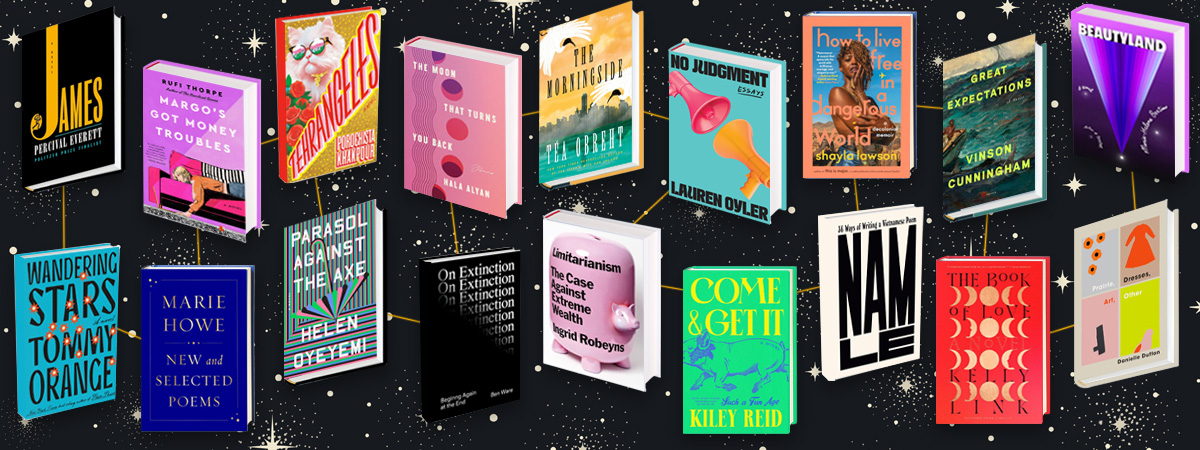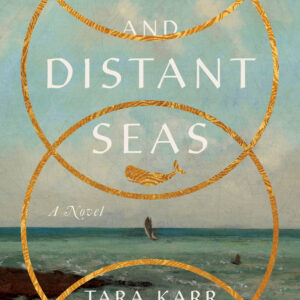FEBRUARY
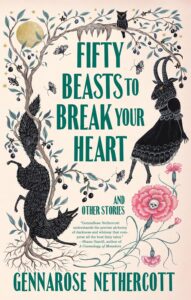
GennaRose Nethercott, Fifty Beasts to Break Your Heart: Stories
Vintage, February 6
Nethercott continues to build on the successes of her magical debut Thistlefoot with a collection of strange and fantastical tales that bring to mind Neil Gaiman and Kelly Link. Filled with folklore, Americana, and an infectious imagination, every single story is a knockout—but the gorgeously illustrated titular bestiary is a highlight. –DB
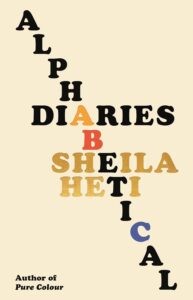
Sheila Heti, Alphabetical Diaries
FSG, February 6
If I’m being honest, I had doubts about this one. The story goes that Sheila Heti—she of literary cool girl status—transcribed ten years’ worth of her diaries into Microsoft Excel, sorted them alphabetically, and voila! Alphabetical Dairies was born. (I’m being completely facetious about the voila; at least I think I am.) What emerges, however, is an entirely new reading experience, and a better portrait of growing into one’s self than most coming-of-age novels I’ve read. I only wish my own diaries were so appealing. –ES
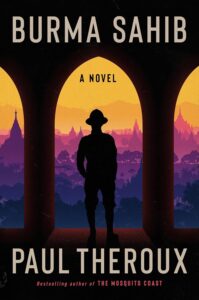
Paul Theroux, Burma Sahib
Mariner Books, February 6
The concept: Retracing the beginnings of George Orwell, born Eric Arthur Blair, an Eton graduate and conscript of the British Empire in India. Burma Sahib follows Eric through his first assignment abroad in colonial India, where he is put in charge of local Burma police and clashes with his superiors. Somewhere along the way this friction sparks the anti-colonial writer we all know. Paul Theroux has taken us back and forth across the subcontinent many times, and this feels like a fascinating journey. –JM
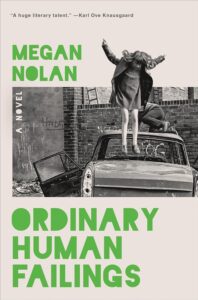
Megan Nolan, Ordinary Human Failings
Little, Brown, February 6
Continuing the boom in Irish lit, Megan Nolan’s latest delves into class and bias in 1990s London. A dead child sparks an investigation by a reporter looking for a good scoop, and leads him toward a family of liminal Irish peasants: the Greens. Among the family is Carmel, once beautiful, we are told, and living a life of disappointment and loss, and hemmed in by family secrets. –JM
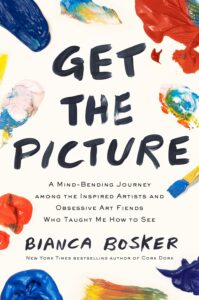
Bianca Bosker, Get the Picture
Viking, February 6
Bosker’s Cork Dork probably my most-gifted book, and I loved her whole-hearted dive into the world of wine. When I found out that her next journey would take her into the fine-art world, I was immediately all-in. It’s a passionate, brilliant examination of why humans make and value art, from a joyous and gifted investigator. –DB
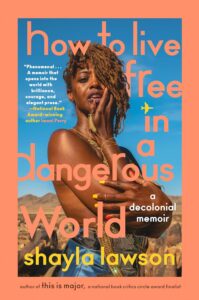
Shayla Lawson, How to Live Free in a Dangerous World: A Decolonial Memoir
Tiny Reparations Books, February 6
If you haven’t encountered Shayla Lawson’s work yet, consider this your formal invitation. How to Live Free in a Dangerous World is a jet-setting memoir that explores race, gender, disability, and love through an unbelievable itinerary: Venice, Zimbabwe, Mexico City, Portugal, Tokyo, Bermuda—the list goes on. Lawson writes with fierceness, wisdom, and vulnerability in a voice that can’t help but captivate. Treat yourself. –ES
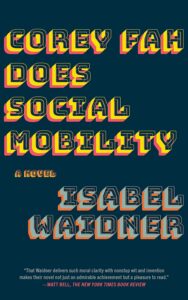
Isabel Waidner, Corey Fah Does Social Mobility
Graywolf, February 6
Corey Fah has been named the winner of a major literary award that turns out to be a UFO… and things get weirder, much much weirder, from there in this bizarre and hilarious look at internet fame and literary success. Waidner’s last novel (Sterling Karat Gold) won the Goldsmiths Prize, which is awarded to fiction that “extends the possibilities of the novel”—and Corey Fah promises even more gonzo imagination and structural strangeness. –DB
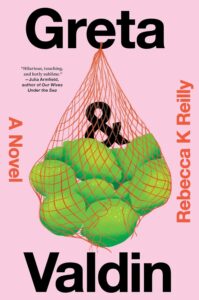
Rebecca K. Reilly, Greta & Valdin
Avid Reader Press, February 6
This novel is being pitched as Normal People meets Schitt’s Creek, which I have to say . . . I really cannot imagine. But if it’s as funny as early reports suggest, I’ll be giving this novel, a quirky family epic/queer love story that was a bestseller in the author’s native New Zealand, a chance. I think we’ll be needing some extra light this year. –ET

Ingrid Robeyns, Limitarianism: The Case Against Extreme Wealth
Astra House, February 6
Belgian economist and philosopher Robeyns coined the term “limitarianism,” which refers to the idea that there should be a cap on how much money any one person is able to accumulate; this is her argument for its practical value to the world at large (even rich people). It’s not as radical as it sounds, especially given the state of, well, everything right now. –ET
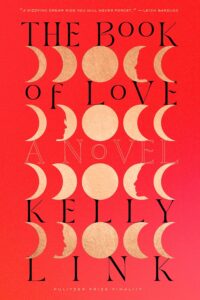
Kelly Link, The Book of Love
Random House, February 13
It’s not so often that a debut novelist is already a MacArthur “Genius” Grant recipient and a Pulitzer finalist, but then we’ve been waiting for Kelly Link’s debut novel for a long time now. Lovers of big, immersive literary fantasy (and, of course, of Link) will not be disappointed—this is a nimble, clever, and deeply satisfying novel, in which a handful of teenagers, most of them recently dead, get dragged into an age-old grudge match between mythic creatures of unending (or possibly ending, but no spoilers) power. All of it is rendered in Link’s trademark winking, personable prose, which tends to deliver something pleasurable on every page. (Very often, in this case, it is a sassy comeback.) So yes, this novel has Big Buffy Energy—that is, sometimes it is fun and ridiculous, sometimes it is a tragedy on an epic scale, but always there is someone looking askance at the goings-on, even while their world is ending. Well, there are worse ways to get through February. –ET
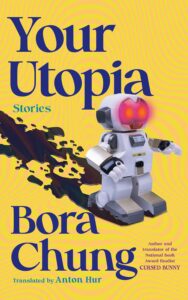
Bora Chung, tr. Anton Hur, Your Utopia: Stories
Algonquin Books, February 13
Chung’s last short story collection, Cursed Bunny, also translated by Hur, was shortlisted for the International Booker Prize and was a finalist for the 2023 National Book Award in Translated Literature; I can only assume this one will be just as good. If you need any further convincing, read Hur’s answers to our interview questions from earlier this year. –ET
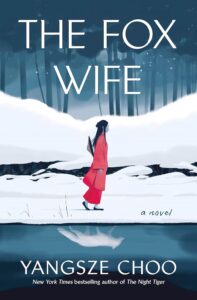
Yangsze Choo, The Fox Wife
Henry Holt, February 13
Late in the Qing Empire, foxes are rumored to be gods of a kind, capable of luring people to their deaths by appearing as beautiful men and women. A courtesan is found dead, kicking off an investigation by a man named Bao. His quest crosses paths with a bereaved mother and a family cursed to see their eldest sons die before their twenty-fourth birthdays. Lots of mythology, family intrigue, and of course foxes. –JM
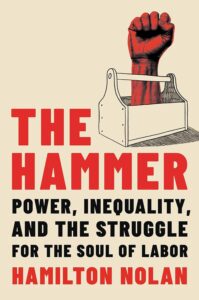
Hamilton Nolan, The Hammer: Power, Inequality, and the Struggle for the Soul of Labor
Hachette, February 13
You don’t have to read Thomas Piketty’s Capital to understand that extreme wealth disparity is bad for any society (but it helps!). And as labor reporter and longtime Gawker writer Hamilton Nolan shows with The Hammer, the best way to reverse America’s decades-long slide into a new Gilded Age is through the power of organized labor. Though unions have long been targeted by those in power, Nolan shows how a new generation of activists—catalyzed by the stark lessons of the pandemic—has rallied support for labor across this country, winning some real battles in the long, slow war against the top of the wealth pyramid. –JD
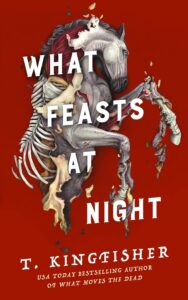
T. Kingfisher, What Feasts at Night
Tordotcom, February 13
Alex Easton returns in the sequel to Kingfisher’s What Moves the Dead, her spectacular re-telling of “The Fall of the House of Usher.” Easton has made it back home to Gallacia but the family estate is in total disarray, the groundskeeper is dead, and rumors abound about a breath-stealing monster out of folklore. It’s sure to be eerie and gripping, as Kingfisher novellas always are. –DB
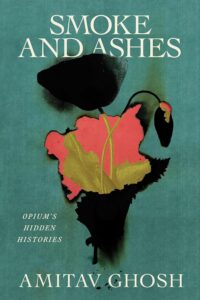
Amitav Ghosh, Smoke and Ashes: A Writer’s Journey through Opium’s Hidden Histories
FSG, February 13
Amitav Ghosh, it would seem, can just about do it all as a writer: as a wonderful novelist, a brilliant essayist, and now, with Smoke and Ashes, as a historian-cum-memoirist-cum-travel writer. Based on decades of archival research, both personal and historical, Ghosh’s hybrid history follows the intersecting routes of the 19th-century opium trade, a transnational economy powered by the devastating fusion of colonialism and capitalism. As one of the world’s first truly global commodities, opium made its way from China to India to Britain and back again, impacting the lives of many millions, from the lowliest deckhands to the richest New York families to members of Ghosh’s very own family. –JD
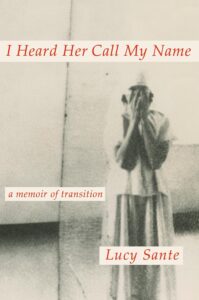
Lucy Sante, I Heard Her Call My Name: A Memoir of Transition
Penguin Press, February 13
The iconoclastic Sante opens up with stories about her life (born in Belgium, transplanted to the US, finding her way in ‘70s NYC) to help illuminate the journey of personal discovery that led to her transition. Not to be missed, it’s a powerful example of self-reflection and a vibrant exploration of the modern dynamics of gender and identity. –DB
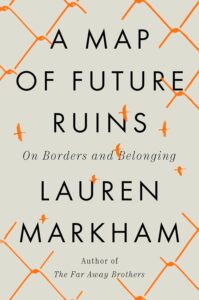
Lauren Markham, A Map of Future Ruins: On Borders and Belonging
Riverhead, February 13
Lauren Markham’s intrepid reporting is always a pleasure to read, and you get the feeling that with A Map of Futures many of her writerly interests, from the heritage of ideas to her own family heritage, and, of course, the ethics and praxis of migration, have found their perfect combination. This book charts how a sprawling refugee camp in Greece, that no one wanted in the first place, was burnt down in 2020, with six young Afghan refugees arrested for the crime. –SR
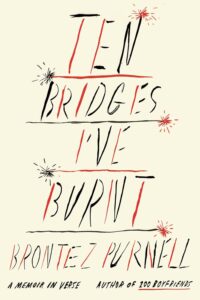
Brontez Purnell, Ten Bridges I’ve Burnt: A Memoir in Verse
MCD/FSG, February 13
To say that Brontez Purnell is one of my favorite American writers isn’t quite right, mostly because the word “writer” doesn’t nearly encapsulate the high-camp-queer-gonzo-performance-art that is inseparable from his daily life. Written in a similarly hectic style to 2021’s 100 Boyfriends, this is a memoir in 38 fragments that pulls no punches: one of the essays is in fact about a punch-on at a poetry reading. –SR
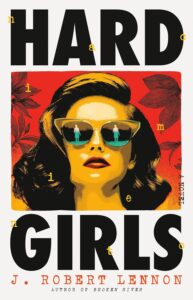
J. Robert Lennon, Hard Girls
Mulholland Books, February 20
J. Robert Lennon is one of the great genre-hoppers and I can’t wait to see what he gets up to in the crime sphere. We’ve got estranged twins reconnecting to find their mother, globe-hopping adventure, family secrets, and the pace of a great thriller? Plus, things are often quite a bit stranger than what the jacket copy says in a Lennon novel, so I’m excited to see how this goes. And it’s apparently the first in a series! –DB
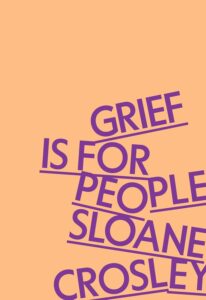
Sloane Crosley, Grief is for People
MCD, February 27
I love Sloane Crosley’s voice: she’s wry and conversational and real, and she feels like someone I know, or want to know. Which makes it all the harder when she goes through something devastating, as she did a couple years ago: she lost her closest friend Russell, her old boss, her dearest confidante, to suicide. Grief is For People is her attempt at comprehending the incomprehensible: how this could have happened, were there signs, and most horribly, was there anything she could have done to prevent it. A suicide memoir can be a tough cookie, but this one manages to not be as brutal as they can be. It is more a meditation on loss, and a eulogy for this man she loved than anything else, and manages to hold onto that trademark Crosley humor and tenderness throughout. –JH
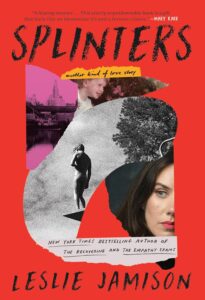
Leslie Jamison, Splinters: Another Kind of Love Story
Little, Brown, February 20
I haven’t read a book so earth-shatteringly honest as this in a while: it brings to mind I Love You, But I’ve Chosen Darkness by Claire Vaye Watkins in its rawness, its truth. We last heard from Leslie Jamison with Make it Scream, Make It Burn, a trademark book of Jamison essays that discussed, among many other things, her marriage. Here we are on the other side, after the splintering, after the marriage ended. Splinters is about divorce, and family, and motherhood, and lineage, and mainly about the stories of our life: what to do when the story no longer fits. How to put together a quest for beauty and the ugliness of a hard marriage and hard choices. How to move forward, how to forgive ourselves. The best, most bracing, powerful memoir I’ve read: set an alert for February 20th and get it as soon as you can. –JH
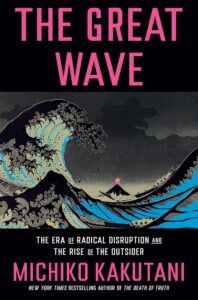
Michiko Kakutani, The Great Wave: The Era of Radical Disruption and the Rise of the Outsider
Crown, February 20
What has the ex-chief book critic of the New York Times been up to? Well, this: A deep-dive into the chaos post-Global Financial Crisis. It’s a story of digital disruption, the politics of outsiders, and multiplying crises. Author Joseph Ellis writes that “If you’re trying to decide whether the world is going crazy or you are, Michiko Kakutani’s new book should prove uplifting.” ‘Tis me. –JM
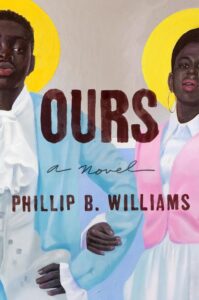
Phillip B. Williams, Ours
Viking, February 20
In the 1830s, a woman named Saint creates a hidden town outside St. Louis she calls “Ours.” There, she welcomes those she has freed from slavery by attacking plantations, attempting to keep Ours a utopia for those within. But over time, her power to magically conceal the town falters, and cracks appear in the safety of her sanctum. What is freedom if you can’t leave? If you loved Libertie, or you’re a Toni Morrison acolyte, this one will be a goodie. –JM
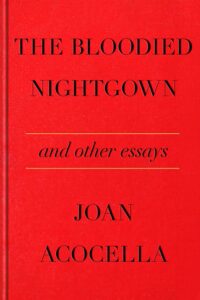
Joan Acocella, The Bloodied Nightgown and Other Essays
FSG, February 20
Joan Acocella has been on staff at the New Yorker for almost 30 years, and has tackled all manner of art as critic (dance, foremost, but her insights stretch to everything from Richard Pryor’s comedy to Greta Gerwig’s Little Women). Here, a collection spanning the past decade and a half gathers sharp insights on J.R.R. Tolkien’s translation of Beowulf and the writer Elmore Leonard, among 22 other witty, probing essays. –JM
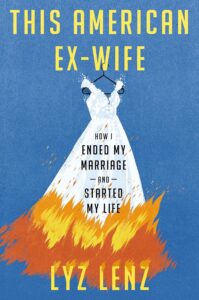
Lyz Lenz, This American Ex-Wife: How I Ended My Marriage and Started My Life
Crown, February 20
Lyz Lenz is a fearless writer. Whether via tweet, newsletter, or book, Lenz is always ready to call out the myriad hypocrites and idiots that seem to dominate contemporary American life (regardless of how powerful the idiot in question might be). With This American Wife Lenz adds to her already impressive canon of cultural criticism by taking on one of patriarchal America’s bedrock institutions: marriage. Through a vivid mix of research, reporting, and personal anecdote, Lenz reveals the power imbalances inherent to traditional heterosexual marriage, and calls for a radical act of refusal by women who have been too-long defined by their relationships to men. –JD
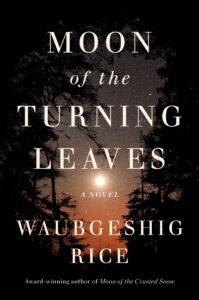
Waubgeshig Rice, Moon of the Turning Leaves
William Morrow, February 27
Post-apocalypse, a community of Anishinaabe people have made a new home in what was at one time called Northern Ontario, Canada, finding that their ancestor’s ways aren’t enough to sustain them on their land anymore and that they must move on. A small exploration party, led by Evan Whitesky, hikes toward the Great Lakes region, encountering the ruins of their old life and the threat of other survivors. –JM
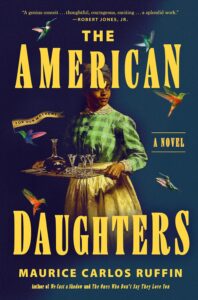
Maurice Carlos Ruffin, The American Daughters
One World, February 27
Ady and her mother Sanite are together in the French Quarter, enslaved to the same man when the novel opens, but of course slavery means that staying together is never a guarantee. Alone, Ady meets a free woman who introduces her to a secret society of revolutionaries–the titular “Daughters”–and sets things in motion for Ady. Ruffin is a son of NoLa, and his previous novel We Cast a Shadow was a finalist for the PEN/Faulkner Award among many other noms. –JM
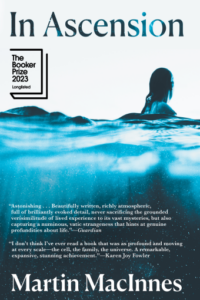
Martin MacInnes, In Ascension
Black Cat, February 27
I can’t wait to read this Booker longlisted novel, which takes its protagonist, Leigh, from the unfathomable depths of the ocean to the farthest reaches of the cosmos, while ruminating on little things like existence and big things like familial obligation and love. A literary sci-fi doorstopper is just what the dark days of February call for. –ES

Steve Coll, The Achilles Trap: Saddam Hussein, The C.I.A., and the Origins of America’s Invasion of Iraq
Penguin Press, February 27
Nothing good ever comes from a nuclear power’s asymmetrical response to terrorism, no matter how awful the act; more often than not, many thousands of innocent civilians end up dead. This is but one terrible lesson from Steve Coll’s in-depth new history of America’s misadventures in Iraq and the man at the heart of it all: Saddam Hussein. Drawing from a wide variety of sources—unpublished reports, eye-witness interviews, Hussein’s own personal archives—Coll assembles a portrait of a paranoid dictator who found enemies wherever he looked, some of whom (looking at you Bush family), made the tragic mistake of confirming his worst fears. –JD
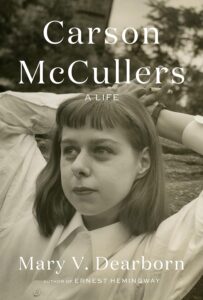
Mary V. Dearborn, Carson McCullers: A Life
Knopf, February 27
The broad strokes of Carson McCullers are: born in the South, a smash debut novel at age 23—The Heart Is a Lonely Hunter, published in 1940—and a wild marriage that ended in the suicide of her jealous husband. Dearborn goes deeper here into McCullers’ life using letters and journals to build out the biography of one of the South’s great writers and offer a more complex portrait of someone who felt she was “born a man” and felt a deal of friction between her understanding of the world and that of the people in it. –JM
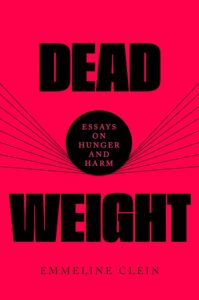
Emmeline Clein, Dead Weight: Essays on Hunger and Harm
Knopf, February 27
The body-positivity, body-neutrality and anti-diet cultural waves have at times limited discussion of eating disorders and dulled the historical nature of the urge to shrink one’s body. Busting somewhat out of the discourse, Emmeline Clein’s essay collection on “harm and hunger” goes back to Anne Boleyn and forwards to the era of, in her own coinage, “dissociative feminism,” if you recall her viral 2019 BuzzFeed essay, promising to promote “radical acceptance of all our appetites instead: for food, connection, and love.” –JM

